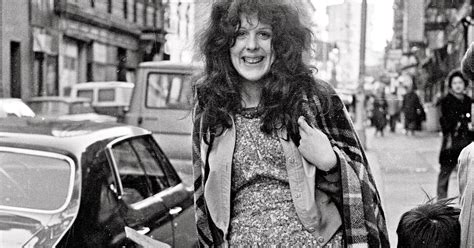A Quote by James Gray
As ugly an admission as this is, I met my wife at a party, and if I had been to the same party and she were dressed in different clothes, I might never have talked to her. She might have projected something that I found distasteful, even if she otherwise looked exactly the same - a beautiful woman to me.
Related Quotes
She was beautiful, but not like those girls in the magazines. She was beautiful, for the way she thought. She was beautiful, for the sparkle in her eyes when she talked about something she loved. She was beautiful, for her ability to make other people smile, even if she was sad. No, she wasn't beautiful for something as temporary as her looks. She was beautiful, deep down to her soul. She is beautiful.
There were plenty of women around who dressed smartly, and plenty more who dressed to impress, but this girl was different. Totally different. She wore her clothing with such utter naturalness and grace that she could have been a bird that had wrapped itself in a special wind as it made ready to fly off to another world. He had never seen a woman who wore her clothes with such apparent joy. And the clothes themselves looked as if, in being draped on her body, they had won new life for themselves.
although she went home that night feeling happier than she had ever been in her short life, she did not confuse the golf course party with a good party, and she did not tell herself she had a pleasant time. it had been, she felt, a dumb event preceded by excellent invitations. what frankie did that was unusual was to imagine herself in control. the drinks, the clothes, the instructions, the food (there had been none), the location, everything. she asked herself: if i were in charge, how could i have done it better?
The pain was as unexpected as a thunderclap in a clear sky. Eddis's chest tightened, as something closed around her heart. A deep breath might have calmed her, but she couldn't draw one. She wondered if she was ill, and she even thought briefly that she might have been poisoned. She felt Attolia reach out and take her hand. To the court it was unexceptional, hardly noticed, but to Eddis it was an anchor, and she held on to it as if to a lifeline. Sounis was looking at her with concern. Her responding smile was artificial.
I get goose-bumps when you talk about Diane Wilson. Who knows where she found that courage? When she was a child, she would crawl under the bed when a stranger came to the house. But in 1989, she found out that her county in south Texas was ranked worst in the country for toxic waste. She wondered if the effluent, dumped into the waters where she and her family had shrimped for generations, might be responsible for the dwindling fish populations. And she suspected that her son's autism might be related to the pollution.
Tessa had begun to tremble. This is what she had always wanted someone to say. What she had always, in the darkest corner of her heart, wanted Will to say. Will, the boy who loved the same books she did, the same poetry she did, who made her laugh even when she was furious. And here he was standing in front of her, telling her he loved the words of her heart, the shape of her soul. Telling her something she had never imagined anyone would ever tell her. Telling her something she would never be told again, not in this way. And not by him. And it did not matter. "It's too late", she said.
But the thought arrived inside her like a train: Marya Morevna, all in black, here and now, was a point at which all the women she had been met—the Yaichkan and the Leningrader and the chyerti maiden; the girl who saw the birds, and the girl who never did—the woman she was and the woman she might have been and the woman she would always be, forever intersecting and colliding, a thousand birds falling from a thousand oaks, over and over.
It is an important distinction to note that she looked not only as if she had taken good care of herself, but that she had good reason to have done so. (...) She looked to be in such total possession of her life that only the most confident men could continue to look at her if she looked back at them. Even in bus stations, she was a woman who was stared at only until she looked back.
We might have been ready to offer sympathy, but in actuality there were stronger reasons to want to congratulate her for having found such a powerful motive to feel sad. We should have envied her for having located someone without whom she so firmly felt she could not survive, beyond the gate let along in a bare student bedroom in a suburb of Rio. If she had been able to view her situation from a sufficient distance, she might have been able to recognise this as one of the high points in her life.
The doctor's wife wasn't a bad woman. She was sufficiently convinced of her own importance to believe that God actually did watch everything she did and listen to everything she said, and she was too taken up with rooting out the pride she was prone to feeling in her own holiness to notice any other failings she might have had. She was a do-gooder, which means that all the ill she did, she did without realizing it.
That was the dirty secret associated with her past. Not that she'd been abused but that somehow she felt that she deserved it because she'd let it happen. Even now, it shamed her, and there were times when she felt hideously ugly, as though the scars that had been left behind were visible to everyone.




































